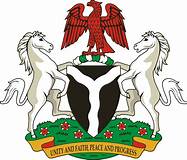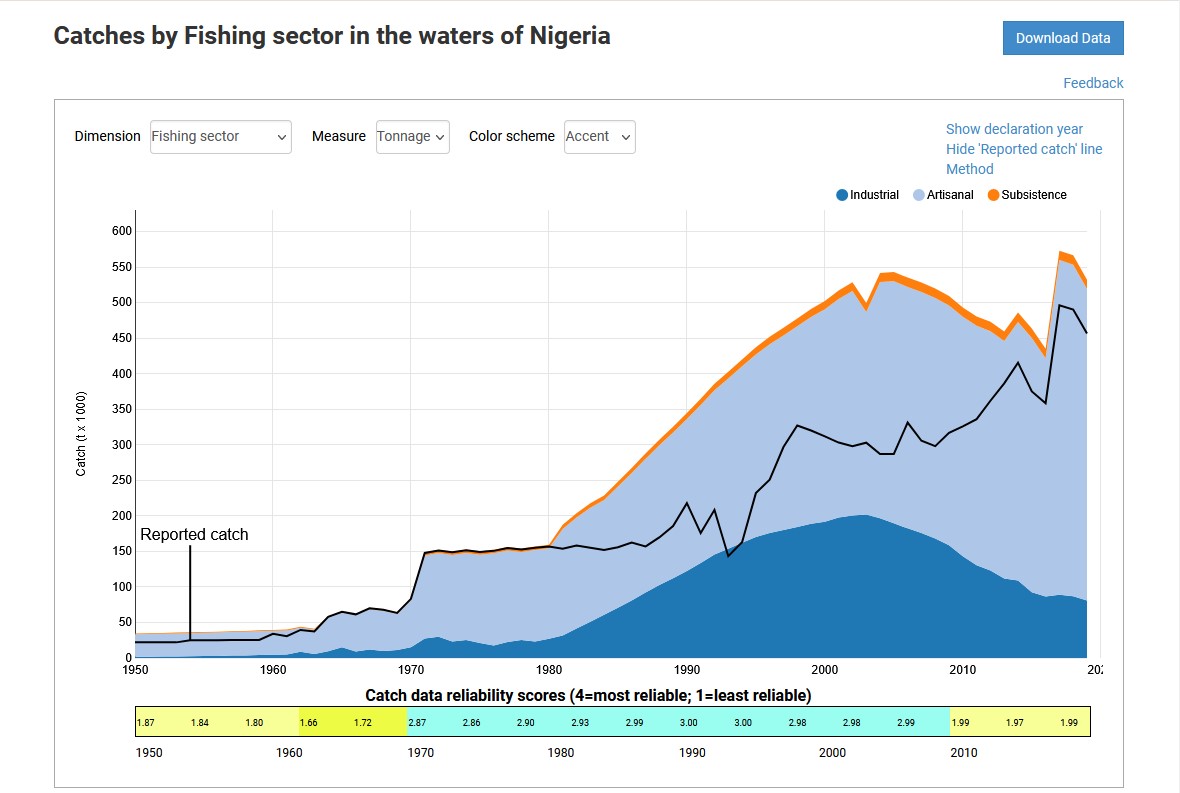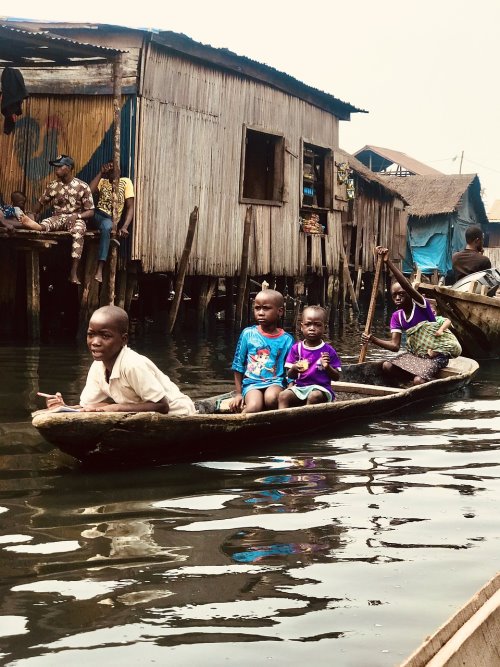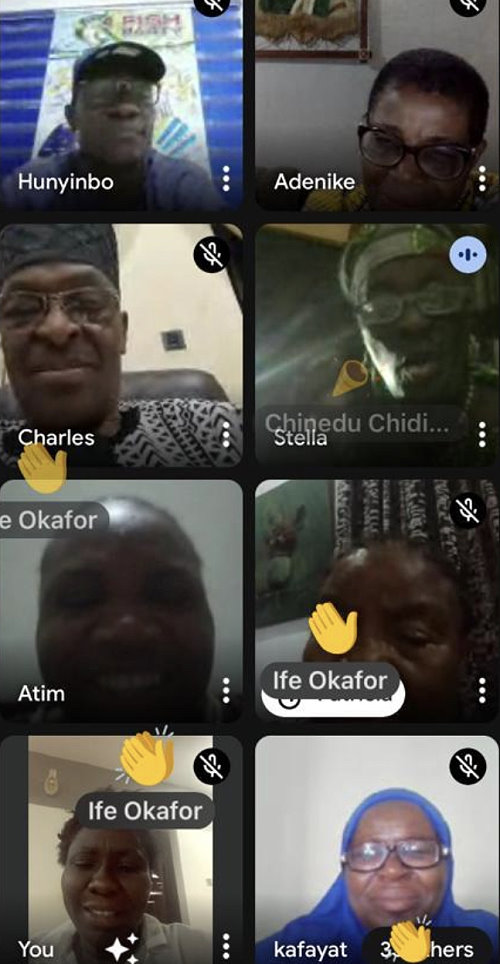The new President of Nigeria has created a Ministry of Marine and Blue Economy as one of the innovations to social and economic development of Nigeria. However, fisheries and associated issues of healthy and productive aquatic environments remain so far under the Ministry of Agriculture, even though they are very important to a sustainable Blue Economy.

The webinar organised on 26 September 2023 by Mundus maris and Fish Party with educational and research partners in Nigeria was intended to cast light on this sector and what was needed to enhance its resilience. Special attention was paid to “Gender and Youths’ Economic Sustainability in the Decade of the Ocean Dialogue” as noted in the subtitle.
The distinguished speakers included
- Ambassador Florentina Adenike Ukonga, Executive Secretary, Gulf of Guinea Commission
- Dr. Remi Akintoye, Fisheries Expert and Former Lagos State Commissioner for Agriculture.
- Dr. Ife Okafor-Yarwood, Fisheries Expert and Lecturer in Sustainable Development, St. Andrews University
- Dr. Mrs. Obatola, representing the Executive Director, Captain (Prof.) Abiodun Sule of Nigerian Institute of Oceanography and Marine Research (NIOMR)
- Prof. Shehu Akintola, Dean, Faculty of Agriculture, Lagos State University (LASU, Director; FAO Voluntary Small-Scale Fisheries (SSF) Guidelines in Nigeria; Member of the global research networks V2V and TBTI)
- Mr. Idowu Hunyinbo, CEO, FishParty, NGO, Nigeria and a staff of the Federal Department of Fisheries in Lagos.
- Captain Oladele Robinson Akinwale, Secretary General of the Lagos State Fishermen Corporative Association.
Prof. Stella Williams, Vice President, Mundus maris moderated the session, while Ms. Ayojesutomi Abiodon Solanke ensured the technical support.

The lively exchange brought to light quite a series of difficulties men and women in artisanal fisheries face in Nigeria even though they play an important role for local fish food production, processing and marketing. Their role exceeds the industrial fishery landings, though the statistics were in poor state, particularly since the fisheries department had moved from Lagos to Abuja and was integrated into the Ministry of Agriculture. It was indeed very hard to keep track particularly of widely dispersed artisanal production in inland waters.
Several speakers, including Dr. Ife Okafor-Yarwood and Dr. Remi Akintoye spoke about the serious living conditions and lack of technical and social support to people working in artisanal fisheries during their field work.
Prof. Shehu Akintola drew attention to the importance of advancing with the implementation of the Voluntary Guidelines for Securing Sustainable Small-Scale Fisheries in the context of food security and poverty eradication, adopted by the FAO Committee of Fisheries in 2014.
Mr. Idowu Hunyinbo and all other speakers underscored the importance of ensuring good governance of the sector through stronger engagement of public administrations. In the light of stressed resources from plastic and other pollution and overfished resources, there was agreement that larger investments into education and training particularly of young people was essential to create a broader array of job opportunities also outside the conventional value chains in fisheries.

It was thus unlikely that many more people could find good jobs in the sector and better access to education was a way to open opportunities in other sectors. Young people needed such opportunities to not fall prey to criminal gangs for perceived lack of alternatives.
It was repeatedly said that good will and many ideas existed on how to address the often serious problems, but that it was exceedingly difficult to contribute to solutions in the absence of dialogue with the responsible administrations and little or no visible willingness to act.
Captain Oladele Robinson Akinwale remarked that coastal fishers suffered from too small a zone reserved for them, 5 nautical miles. There is simply not enough fish to caught in the inshore waters. He mentioned that a proposal was under consideration in Ghana to extend the Inshore Exclusion Zone to 12 nautical miles. That could improve the conditions of fishers. In addition, even these currently reserved 5 nm inshore waters were not sufficiently enforced by the coast guard to keep industrial vessels out. He saw an encouraging development in the opening of a new fibre glass boat construction company from Sri Lanka. The new vessels with 40 hp outboard engines and electronic navigation and fish finding equipment were suitable for fishing safely further away from the coast. A first group of fishers already underwent training.
Here are key findings of the debate:
Nigerian artisanal fishers, men and women, produce about 70% of domestic fisheries products from marine and inland water resources. They thus contribute much towards closing the gap to demand requiring costly imports now estimated up to 2 million tons. The value chain worth up to USD 7 billion according to recent studies secures the livelihoods of an estimated over five million people directly involved and is a major contributor to food security in the country. However, poor statistics, which are not up to date, represent a major obstacle to improving governance and productivity. Estimates above are based on field work of researchers and practitioners.

Even the partial documentation highlighted by the speakers illustrates the following challenges and opportunities requiring government intervention:
- Transfer fisheries and aquaculture to the new Ministry of Marine and Blue Economy and therein create a directorate in charge of all governance related aspects. One of the first duties would be to set up a statistical system underpinning policy and management.
- Reduce overfishing in abundant inland waters to sustain rich resources through supporting better living conditions and alternative job creation for youths.
- Extend the zone reserved for coastal artisanal fishers from 5 nautical miles to 12 nautical miles and enforce the regulation against the illegal incursion of industrial vessels.
- Curb criminal violence against coastal fishers and support the dissemination of safer craft to extend their productive range, thus securing jobs and food production in cost-effective ways.
- Collaborate with other ministries and relevant agencies to reduce plastic and oil pollution which affect public health and marine production in major ways.
- Collaborate with other ministries and relevant agencies to improve social services of the productive fisheries and aquaculture sector, in particular education and health, and diversified youth employment creation, also as a preventive measure against criminality.
Her Excellency, Ambassador, Mrs Adenike Ukonga offered to facilitate a connection to the new ministry as one way to develop dialogue and hopefully collaboration between the ministry, educational and research institutions, civil society and professional organisations.
The two hours conversation with more than 40 participants opened a window to better understanding and dialogue. It is hoped that this could be the beginning of more collaboration towards sustainable artisanal fisheries and fishers in the country.
Small-Scale Fisheries Academy
- Make Fishing Fair in the EU, 25 March 2025
- Human – Biodiversity Relationships Across Scales
- World Fisheries Day, 21 November 2024, celebrated in Nigeria
- Mundus maris participated in the 2024 World Fisheries Day organized by Canoe and Fishing Gear Association of Ghana (CaFGOAG).
- Mundus maris contribution to the UNOC3 public consultation
- Small-Scale Fisheries Summit in Rome, 5-7 July 2024
- Regional Symposium on European Small-Scale Fisheries, Larnaca, Cyprus, 1-3 July 2024
- Baltic Fisheries Emergency Meeting, Brussels, 26 June 2024
- Ambivalent role of Market and Technology in the Transitions from Vulnerability to Viability: Nexus in Senegal SSF
- Shell fisheries as stewardship for mangroves
- African edition of 4WSFC in Cape Town, 21 to 23 November 2022
- World Fisheries Day, 21 November 2023
- Webinar: Nigeria’s Fisheries challenges and opportunities
- Presenting the FishBase app at the Symposium in Tervuren
- MARE Conference on Blue Fear – Mundus maris reflects
- The Transition From Vulnerability to Viability Through Illuminating Hidden Harvests, 26 May 2023
- EGU sessions focused on geoethics and joint learning, 23-28 April 2023
- Solidarity with artisanal fishers in Senegal and Mauritania
- The legal instruments for the development of sustainable small-scale fisheries governance in Nigeria, 31 March 2023
- Tools for Gender Analysis: Understanding Vulnerability and Empowerment, 17 February 2023
- Community resilience: A framework for non-traditional field research, 27 January 2023
- Sustainability at scale – V2V November webinar
- European edition of 4WSFC in Malta, 12-14 September 2022
- Mundus maris contributes to SSF Summit in Rome
- Women fish traders in Yoff and Hann, Senegal, victims or shapers of their destiny?
- The Academy continues its work in Yoff
- Illuminating the Hidden Harvest – a snapshot
- Virtual launch event FAO: International Year of Artisanal Fisheries and Aquaculture
- The Small-Scale Fisheries Academy as a source of operational support to PA Guidelines
- World Fisheries Congress, Adelaide, 20-24 September
- Mundus maris supports the fight of Paolo, the fisher, in Tuscany, Italy
- Catching-up – SSF Academy Yoff, 27 Febr. 2021
- Strengthening capacities of the actors for sustainable small-scale fisheries
- Testing training methods during the pilot phase of the SSF Academy in Senegal
- A premiere – launch of a Small-Scale Fisheries Academy in Senegal
